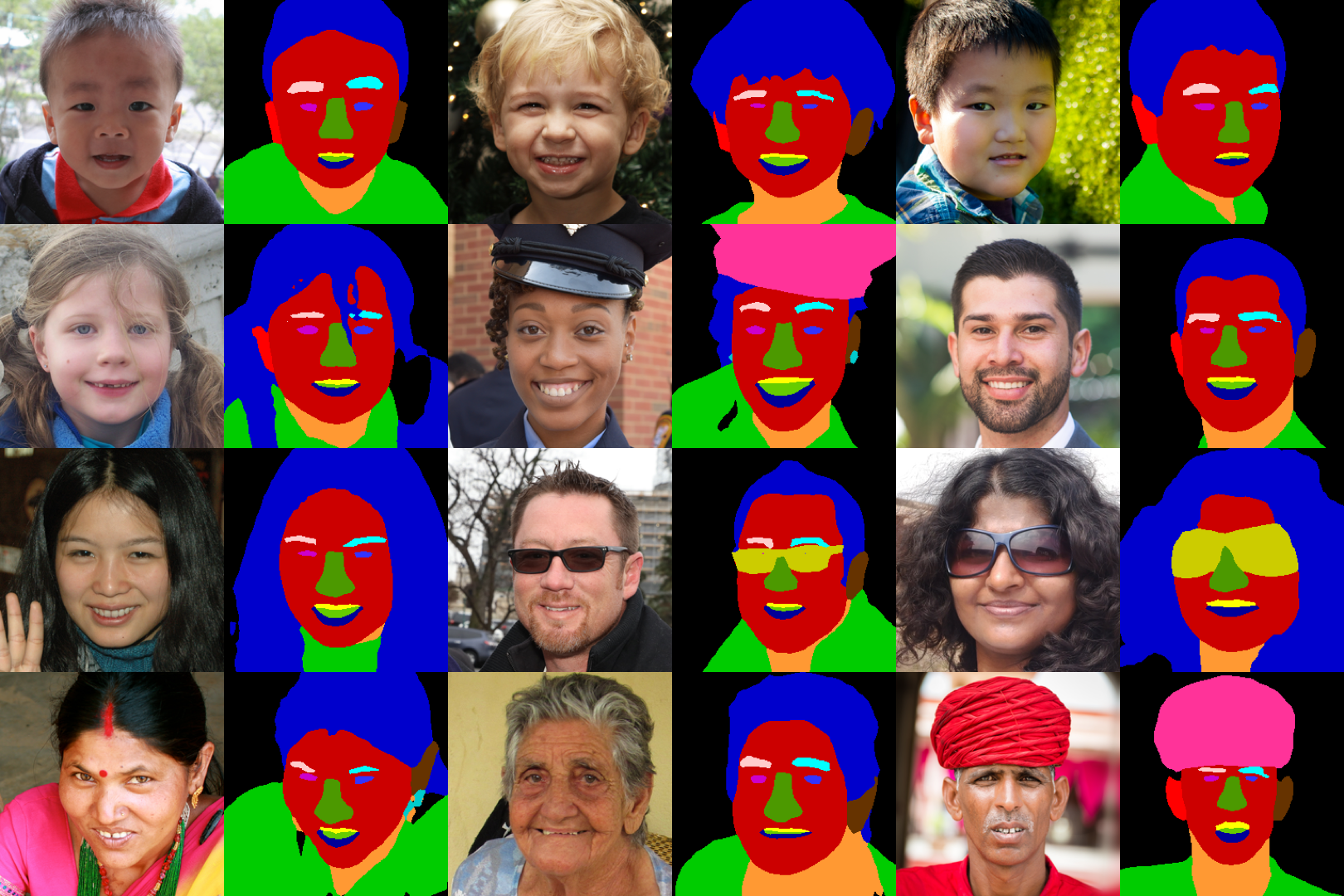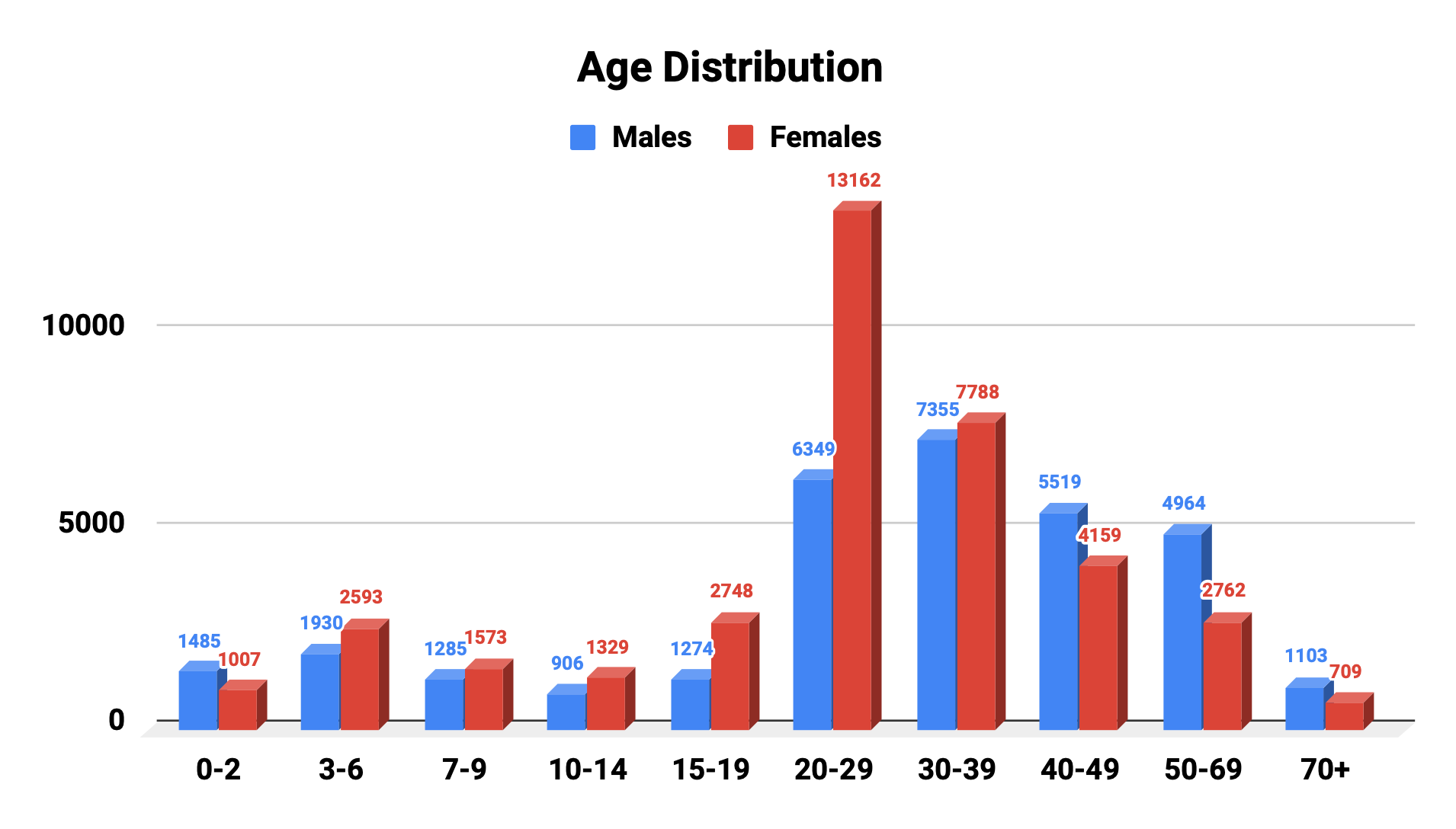FFHQ-Aging is a Dataset of human faces designed for benchmarking age transformation algorithms as well as many other possible vision tasks.
This dataset is an extention of the NVIDIA FFHQ dataset, on top of the 70,000 original FFHQ images, it also contains the following information for each image:
- Gender information (male/female with confidence score)
- Age group information (10 classes with confidence score)
- Head pose (pitch, roll & yaw)
- Glasses type (none, normal or dark)
- Eye occlusion score (0-100, different score for each eye)
- Full semantic map (19 classes, based on CelebAMask-HQ labels)
If you use this dataset for your work, please cite our paper:
Lifespan Age Transformation Synthesis
Roy Or-El, Soumyadip Sengupta, Ohad Fried, Eli Shechtman, Ira Kemelmacher-Shlizerman
ECCV 2020
https://arxiv.org/pdf/2003.09764.pdf
The following histogram shows the age class distribution per gender.
Gender labels & confidence, age class labels & confidence score, head pose, glasses type and left & right eye occlusion scores for each individual image are stored in ffhq_aging_labels.csv.
You must have a GPU with CUDA support in order to run the segmentation code.
This code requires PyTorch to be installed, please go to Pytorch.org for installation info.
In addition, the following python packages should be installed:
- requests
- pillow
- numpy
- scipy
- PyDrive
If any of these packages are not installed on your computer, you can install them using the supplied requirements.txt file:
pip install -r requirements.txt
Note for windows users: make sure that you have a 64bit python version installed. Otherwise you might get a memory error when reading the FFHQ JSON file.
To download the dataset in the default resolution (256x256) run:
Linux & Mac: ./get_ffhq_aging.sh
Windows: get_ffhq_aging.bat
If you encounter a "quota exceeded" error, see Downloading with PyDrive
Google drive enforces a quota on file download by anonymous users. If you encounter a "quota exceeded" error, either wait 24 hours for the quota limit to reset and try again, or follow the procedure below.
Note: this step does not count against your Google Drive storage limit.
- Login to your Google Drive
- Visit ffhq-dataset
Note: this only applies to your download script, and does not give access to other users. Nevertheless, we recommend revoking the script's access after the download is complete.
- Go to : https://developers.google.com/drive/api/v3/quickstart/python
- Click on enable drive API
- Select Desktop app
- Download client configuration
- Rename this file to
client_secrets.jsonand place it in the same folder as the download script (download_ffhq_aging.py).
Update (4/29/2021): Google have updated this page, please follow the prerequisists section of the updated page to get the credential files
- In order to run the code with authntication, edit the
get_ffhq_aging.sh/batscript, and add the--pydriveflag when invokingdownload_ffhq_aging.py. This will open a browser authentication window. Log in to your account and allow access. - If you have no display (like when running from a remote compute server), edit the
get_ffhq_aging.sh/batscript, and also add the--cmd_authflag when invokingdownload_ffhq_aging.py. This will print a Google authentication link to the screen. Open the link in any browser, allow access, and paste the Google authentication token back to the command line.
Important Note: using this will let the code access your Google Drive, which might pose a security risk.
We recommend using it only in cases when the default interface consistently returns a quota exceeded error.
In addition, we recommend to disable the drive API and delete client_secrets.json after the dataset download is complete.
download_ffhq_aging.py
--debug run in debug mode, download 50 random images (default: False)
--pydrive use pydrive interface to download files. It can override google drive quota limitation
this requires google credentials (default: False)
--cmd_auth use command line google authentication when using pydrive interface
this is good when running on a server with no display (default: False)
--check_invalid_images checks for any invalid images and downloads them again
--resolution final resolution of saved images (default: 256)
--num_threads NUM number of concurrent download threads (default: 32)
--num_attempts NUM number of download attempts per file (default: 10)
run_deeplab.py
--resolution segmentation output size (default: 256)
--workers number of data loading workers (default: 4)
Please make sure that the --resolution option for both scripts is the same
The dataset is made available under Creative Commons BY-NC-SA 4.0 license by University of Washington. You can use, redistribute, and adapt it for non-commercial purposes, as long as you (a) give appropriate credit by citing our paper, (b) indicate any changes that you've made, and (c) distribute any derivative works under the same license.
The individual images were published in Flickr by their respective authors under either Creative Commons BY 2.0, Creative Commons BY-NC 2.0, Public Domain Mark 1.0, Public Domain CC0 1.0, or U.S. Government Works license. All of these licenses allow free use, redistribution, and adaptation for non-commercial purposes. However, some of them require giving appropriate credit to the original author, as well as indicating any changes that were made to the images. The license and original author of each image are indicated in the metadata.
- https://creativecommons.org/licenses/by/2.0/
- https://creativecommons.org/licenses/by-nc/2.0/
- https://creativecommons.org/publicdomain/mark/1.0/
- https://creativecommons.org/publicdomain/zero/1.0/
- http://www.usa.gov/copyright.shtml
The JSON metadata is made available under Creative Commons BY-NC-SA 4.0 license by NVIDIA Corporation.
The individual images and JSON metadata are hosted on NVIDIA's Google Drive, please see the original FFHQ dataset for more details.
To find out whether your photo is included in the original Flickr-Faces-HQ dataset and/or get it removed from both this dataset and the original FFHQ dataset please go to the privacy section in the original FFHQ Dataset website and follow the instructions.
We wish to thank Thevina Dokka for helping us collecting the dataset.
Original face images were collected in the NVIDIA FFHQ dataset.
A Style-Based Generator Architecture for Generative Adversarial Networks
Tero Karras, Samuli Laine, Timo Aila, CVPR 2019
http://openaccess.thecvf.com/content_CVPR_2019/papers/Karras_A_Style-Based_Generator_Architecture_for_Generative_Adversarial_Networks_CVPR_2019_paper.pdf
Age & gender labels and confidence scores were collected using the Appen platform.
Head pose, glasses type and eye occlusion score were extraceted using the Face++ platform.
Face Semantic maps were acquired by training a pytorch implementation of DeepLabV3 network on the CelebAMASK-HQ dataset.
Encoder-Decoder with Atrous Separable Convolution for Semantic Image Segmentation
Liang-Chieh Chen, Yukun Zhu, George Papandreou, Florian Schroff, Hartwig Adam, ECCV 2018
http://openaccess.thecvf.com/content_ECCV_2018/papers/Liang-Chieh_Chen_Encoder-Decoder_with_Atrous_ECCV_2018_paper.pdf
MaskGAN: Towards Diverse and Interactive Facial Image Manipulation
Cheng-Han Lee, Ziwei Liu, Lingyun Wu, Ping Luo, CVPR 2020
https://arxiv.org/pdf/1907.11922.pdf

